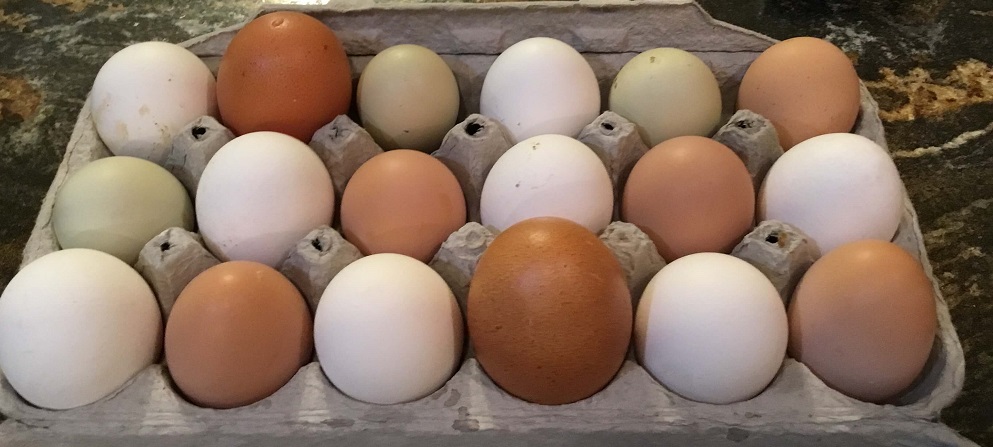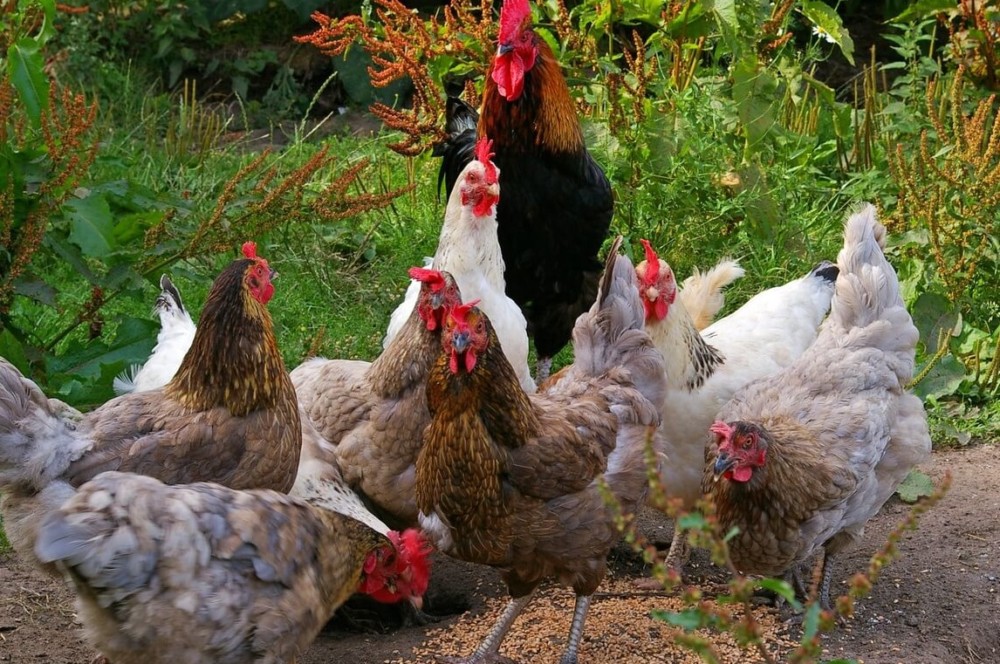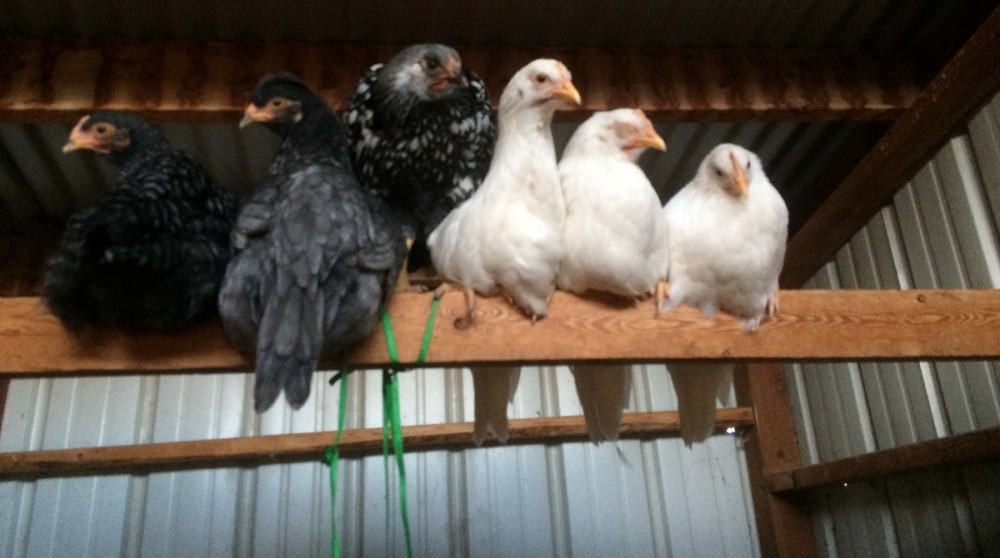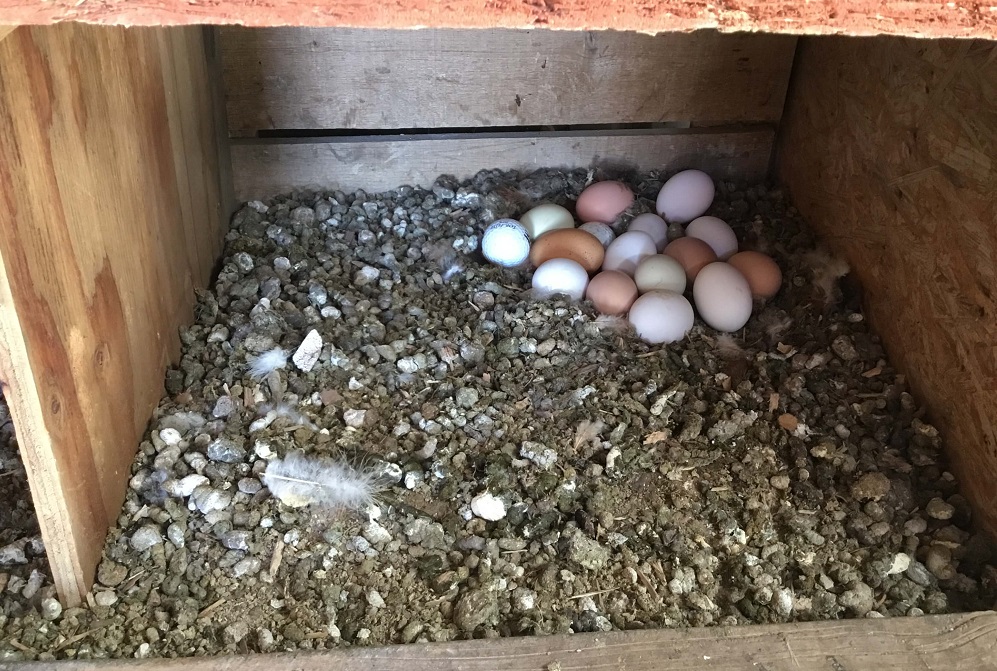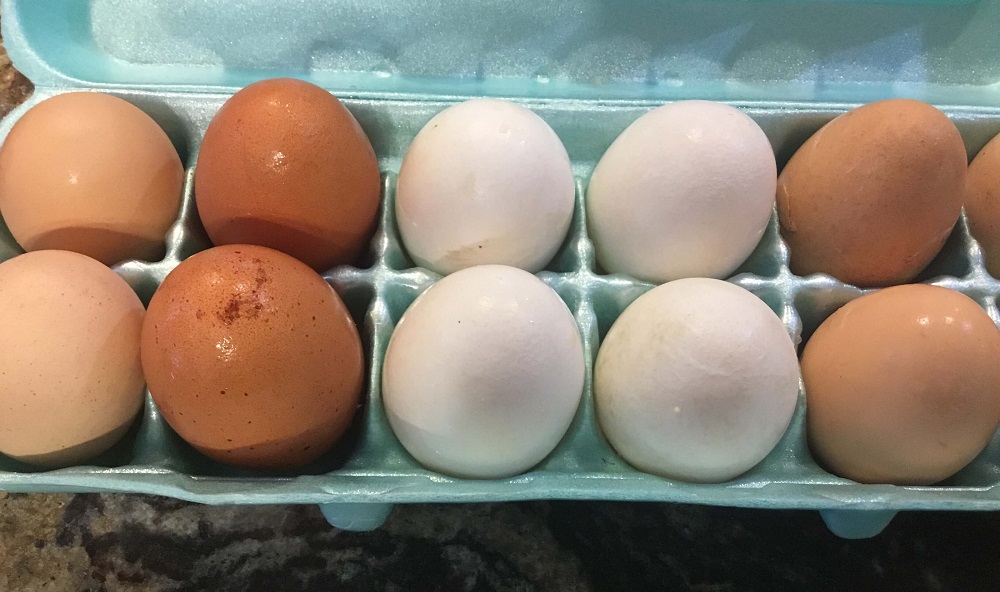Fresh eggs are amazing. They are usually larger than store eggs and taste better with more nutrients and vitamins.
But, it is frustrating if your chickens stop laying eggs. It’s even harder if you have pullets that should have started laying eggs but haven’t. My neighbor and I bought pullets at the same time. She has the same number of chickens as I do. But, her chickens only provide her with 1-2 eggs a day, while my chickens give me between 8-10 eggs every day.
What’s the difference? Why are the same breeds of chickens and the same age of chickens producing so differently? It can’t be blamed on the weather or differences in seasons, or temperature because she lives across the street from me.
If your chickens have stopped laying, there are usually specific reasons why. Fortunately, you can get your chickens laying better within 1-2 weeks.
12 Ways To Get Your Chickens Laying More Eggs
- Provide Constant Fresh Water
- Layer Feed
- Provide Calcium
- Provide Shelter
- Reduce Stressors
- Control Parasites
- Adequate Space
- Clean Nesting Boxes
- Security and Safety
- Address Health Issues
- Female Competition
- Light
Whether you are struggling in the winter, summer, or simply feel that your hens don’t lay as many eggs as they should, this article will help you.
It’s important to know how many eggs you should expect from your girls. Each breed has a different egg-laying capacity. Heritage chickens usually lay a few less eggs a week than some of the modern egg-laying breeds such as the Australorp, Leghorn, or Barred Rock.
Check out my Chicken Breed Guide to check out what you should expect from your breed of chickens.
1. Provide Constant Fresh Water
Freshwater is essential for chickens to consistently lay eggs. It doesn’t matter what season it is or where you live. If you live in a warmer climate, then inadequate water can cause your chickens to stop laying.
In the winter, water makes it possible for your chickens to stay warm and to produce eggs. So if your chickens are struggling laying eggs, first check to make sure that they have constant access to water.
It should be fresh and clean. If you have chickens and ducks, you will need to change it more frequently because ducks get the water so filthy every time they eat.
Change the water every other day or daily. During the hot months, keep the water in the shade so it stays cooler and fresh.
In the colder, winter months keep the water out in the sun so that it stays unfrozen. There are several actions you can take to keep your water from freezing in the winter, but make sure it doesn’t freeze.
It is essential that your chickens have constant access to unfrozen water in the winter. A single day without access to water can stop egg production immediately.
Did you know?
Even one day without water (in the summer or winter) can stop egg production for up to a week!
Layer Feed
Commercial, layer feed is not essential for your chickens. It is possible to have healthy chickens and not have to purchase feed for them.
But,
If your chickens are not laying eggs as they should be, one of the first steps you can take to help them produce eggs is to feed them at least once a day with a layer feed.
This will help to fill in the nutritional and vitamin gaps that they may be missing with their current diet.
Chickens need a variety of nutrients as well as sufficient protein to consistently lay eggs. If they are short on their nutritional needs, egg-laying will be one of the first things to suffer.
This is the single difference between my neighbor and my chickens. Both chickens are free-range. Both flocks are safe, have plenty of space and the other needs listed in this guide.
But, her hens are fed only a supplemental scratch feed, while I feed mine a layer feed once a day.
My chickens get a large variety of food. They free-range all day and get all the bugs and vegetation they want from my yard.
I send my garden scraps and compost items out to my chickens, which gives them additional variety. Carrot peelings, cottage cheese, cooked meat scraps and other leftovers provide my chickens with lots of vitamins and protein.
But, when my chickens miss out on 3-4 days of layer feed, I start to see an immediate drop in egg production.
For some reason, there is still something missing that the layer feed provides. It keeps my chickens laying constantly, even in the winter.
Adequate protein in layer feed also helps to keep your chickens laying. Chickens with less protein will molt longer and more frequently. Molting can wipe out egg production for several weeks, but if your chickens have enough protein, they will molt for a few days, or have a molt that is almost unnoticeable.
Provide Calcium
Calcium is another vital nutrient for hens. There are several ways that you can provide calcium to your chickens.
I use crushed oyster shells that come in a large bag. A few times a week I toss the shells out on the ground with their feed and let the hens eat it. If I have a hen I suspect to be low on calcium, I set out a dish with oyster shells for the hens to have free access to.
I don’t do this constantly because I also have ducks with my chickens and the ducks spill everything! So it’s a way to reduce waste.
You can also provide calcium through cottage cheese, regular cheese (watch the salt content), milk, sour milk, buttermilk, and dark leafy greens.
Another way to provide calcium is to take your eggshells after you use the eggs and crush the shells. Send the crushed shells back out to your chickens to eat.
It helps to recycle calcium. I crush my eggshells so that the chickens don’t recognize the shells as being from their own eggs.
It helps to prevent egg poaching by your flock.
- Crushed Oyster shells
- Crushed eggs shells from your chickens
- Milk, sour milk, buttermilk
- Cheese & cottage cheese
- Leafy Greens: Spinach, Kale, Dark greens
Provide Shelter
In the summer, extreme heat can cause your hens to stop laying as many eggs. In the winter, wind, rain, and snow can affect your flock’s egg-laying abilities.
It’s not too hard to keep them happy and healthy. Simply provide shelter for your girls.
They should be able to go in and out of the coop, a barn, or another shelter during the day. If its too hot, they should be able to go somewhere for shade and to cool down. During cold and wet weather, your hens should also be able to escape to a dry and warmer place.
It’s not necessary to artificially heat or cool the coop. In many cases, that can add an element of danger. A heated coop is more likely to start a fire or catch feathers on fire.
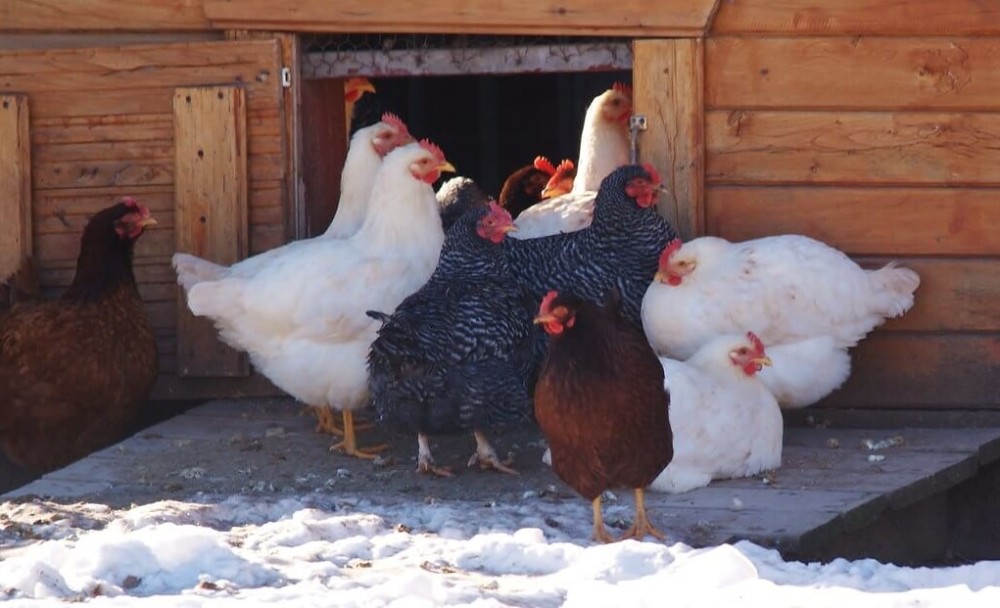
But, a fan through the coop in the summer can help to cool it if the temperature reaches into or over the high 90’s. If you live in a very hot climate, you may need to cool your barn or coop.
Most chicken breeds do better in colder weather than in hot weather.
If your flock free ranges and only goes to the coop at night, there are a few other ways to provide shelter to your flock.
- Plywood leaning against a fence or shed
- Bushes and trees for shade
- A tarp over an area
- Under a porch or deck
- Chicken tractors as portable coops
Reduce Stressors
Stress often causes hens to stop laying. Stress can come in a variety of ways. Kids can cause stress if they are rough with your birds. Dogs, even neighbor dogs can cause stress with barking or chasing of the chickens.
Loud noises can cause stress. If you live in a city and there are more frequent sirens or other noises in a particular week, those can cause your hens to stop laying.
If some of your hens are bored, they can start bullying and the bullied hens can stop laying. Predators or potential predators can scare your birds and cause stress so that they stop laying.
Try to identify any causes of stress. If noise is an issue, consider putting a radio out in the coop. It can help to cover other sudden noises and create a sense of security in the coop.
If boredom is a cause, add some toys, treats, or other fun to the coop.
Try to identify the cause of stress an eliminate or reduce it.
- Children
- Dogs
- Loud noises
- Predators
- Bullying
- Boredom
- Cuts and Sores
Control Parasites
Chickens who have an overabundance of parasites can be bothered to the point that they stop laying eggs. Lice, mites, and other parasites can cause discomfort and distress.
In some cases, these parasites can affect the health of the eggs and make the eggs unsuitable for human consumption.
But, most of the time they only affect the comfort of your hens. I’ve got a full article on caring for various parasites and sicknesses here.
Check your hens for good health. There are several things you want to check. First, do your girls have nice, shiny feathers? Are there bare spots?
Check their tushes. The area around their vent is often one of the first places that start to show issues. If their bum is red, swollen or shows bumps, these are all signs of problems.
Missing feathers and dull feathers are other signs of health issues.
Check their wattles, comb, and feet. If you see scaley, scabbed feet, then your flock may be fighting mites.
For many of these issues, your first defense should be a clean coop. The next easiest defense is to add Diatomaceous Earth to their bedding, which helps to control many pests.
Healthy hens will lay more eggs.
- Check the vent for bumps, cuts or feather loss
- Check the feathers for little lice or mice
- Watch for feather loss or signs of bullying
- Check the feet for scabs that would indicate mites
- Watch the wattles and comb for paleness indicating other pests or nutritional issues
Adequate Space
Another issue that often comes up is when there are too many hens for the amount of space you have. Most breeds of chickens need enough space or the crowded conditions will stress them out.
As a general rule, hens need 10-20 square feet of space per bird in a chicken run. They need 2-3 square feet per bird in the coop and a place to roost.
If you have a small backyard or limited space, you may have too many birds for the space you have. If you do, then it may be necessary to get rid of a few of your birds so that the other hens will start laying more often.
Crowded conditions lead to greater stress. It also leads to boredom and bullying. All of those things individually will affect the frequency that your hens lay.
Look for creative solutions to add more space to your coop. Sometimes adding two layers to a coop or a run can help. It doubles the amount of floor space your girls have and with little extra stumps, playthings, and swings, your girls will stay entertained.
If you have limited space and think that crowding may be affecting your hens, there are some things you can do to minimize the impact of crowding.
- Add more perches
- Add more layers. Different logs, perches, and swings
- Add a second story to your coop to increase the floor space
- Plant vegetation, which will provide, shade, hiding spots, food and privacy
Clean Nesting Boxes
Clean nesting boxes are another need that hens have. I listed this toward the end because I know that most of you already keep clean nesting boxes for your flock.
But,
I also know that sometimes life gets busy and hairy and it can be easy to get behind on cleaning out the coop.
Personally, I like the deep litter method, which means I don’t have to clean out the coop more than once a year, but it keeps my coop clean and full of good bacteria.
But, even with the deep litter method, you still want to make sure and clean out the nesting boxes every week or two. Add clean stray or hay and clean out any droppings that have been left.
Most hens won’t poop in the nesting box, but it seems like there is always at least one….
The deep litter method is done by cleaning out the coop in the spring. Then you add 6 or more inches of mulch and wood chips to the coop.
This gives a nice, deep layer of mulch and wood chips. That deep layer absorbs the urine and dry droppings of your chickens.
Because the layer is so deep, it fosters healthy bacteria as the wood slowly breaks down. By the time the colder weather hits, you should have nice healthy colonies of good bacteria in your coop.
This will help to keep out disease and other issues caused by a dirty coop. And it will save you hours of time each month cleaning out your coop!
Security and Safety
Hens need to feel safe to lay eggs consistently. A major part of that is having a safe coop. Your flock should be locked up at night so that predators can’t reach them.
I’m not aware of anywhere in the world that doesn’t have at least some predators of chickens. Even New Zealand probably has neighborhood dogs that can kill a flock.
If your girls are terrified at night by a predator visit, the stress can cause all or most of the flock to stop laying.
Even the killing of a single hen can traumatize the other hens for weeks.
And, remember that even small predators can wreak havoc. Snakes, raccoons, weasels, skunks, and other predators can often get through very small openings and terrorize your chickens.
There are a lot of steps you can take to secure your chicken coop from predators. The most important steps should include making sure that your door locks and is secure. Make sure that any holes, gaps, tunnels, or other entrances into the coop are blocked.
Even mice holes can allow other predators in.
If you have lost a chicken or if your flock looks stressed in the morning, take a good look at your coop and see if there is anything that could be allowing predators into the coop.
Address Health Issues
A healthy flock will lay better than an unhealthy flock. In addition to checking for parasites and making sure your hens are eating a balanced diet, watch for other health issues they may be facing.
Anything from frostbite to heat exhaustion can affect egg-laying.
Additionally, there are a number of illnesses and poultry ailments that can affect your flock.
Most of those sicknesses, your birds aren’t likely to catch unless they are exposed to them.
One of the best things you can do to keep your flock safe is to limit their exposure to other chickens and ducks.
If you introduce new birds to your flock, even temporarily, take adequate steps to keep your flock from possibly catching other diseases.
Before you add more birds to your flock, isolate the new birds for a minimum of 2 weeks. 4 weeks is even better as some diseases, such as Meraks, can take a while to show symptoms. Watch for signs of illness or other bird diseases.
If you see anything questionable, keep the new chickens isolated from your flock. Do this until you are certain that you won’t be exposing your flock to anything new.
Female Competition
This is a little crazy, but if you have a flock of hens that have gotten a little lax about laying eggs there is a trick that often helps.
Adding new hens to a flock can make a difference in the entire flock’s egg production. It seems that hens see younger, laying hens and get a little competitive.
I’ve seen younger hens cause older hens to start laying better.
A rooster can also help with this. A little male companionship can spur egg production.
It’s not a long term solution. I mean, that it won’t create years of added egg production, but it will help for months at a time.
Egg laying breeds don’t generally live as long as heritage chickens. They tend to lay strongly for up to 3 years and then to peiter out. After that, they usually only live a couple more years.
Heritage chickens won’t lay as many eggs a week, but can lay for up to 5 years before they start to slow down.
I’ve read that chickens have a specific number of eggs inside of them from when they are chicks. At some point, the number of eggs wans and there simply isn’t more eggs for the hen to lay.
Light
Adding a light to your chicken coop can help to keep your hens laying eggs. If you live in the northern part of the world or a southern part of the world, you have part of the year where the days get really short.
I live in Idaho and right now (November) it’s only light from 7:15 am to 5:15 pm. Fewer daylight hours affects how many eggs most breeds will lay.
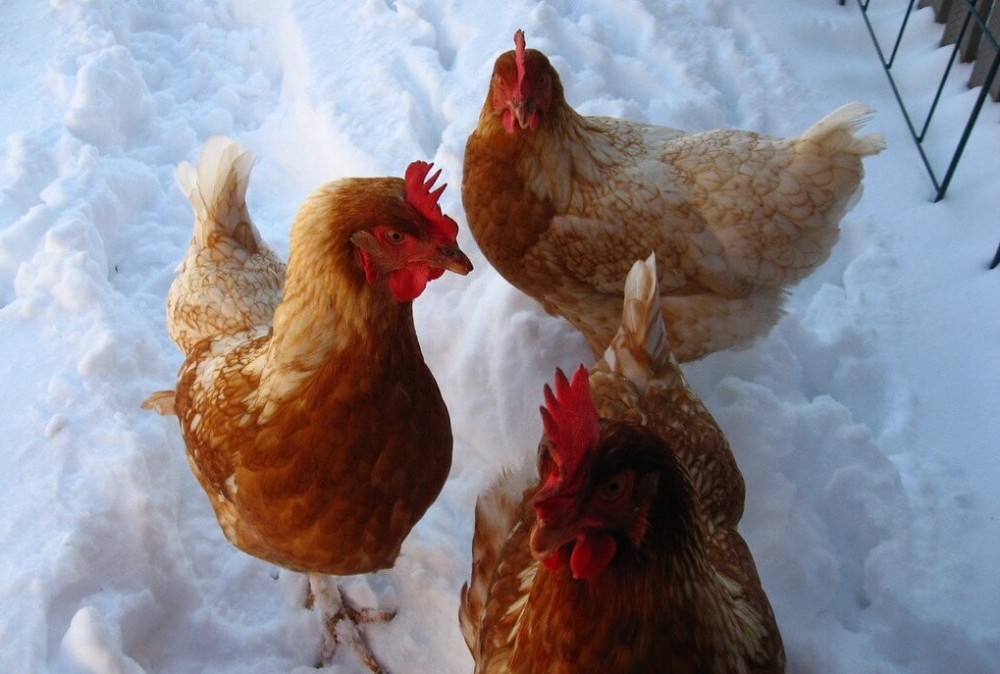
One of the easiest things you can do to bypass this is to add light to the coop. You don’t want light on all day and night- that will stress out your chickens.
But, you can put a light in the coop and add a timer. Have the light come on a couple of hours before sunrise and turn off a couple of hours after sunset.
Your light should be on about 10 hours a day to help with egg production. More than 12 hours of light in the coop can stress out the hens so don’t have it on too long.
Related Questions
Can a hen lay more than one egg a day? Hens can lay 1-2 eggs a day. Usually, hens that lay 2 eggs a day are younger pullets that have just started laying. The eggs will usually be smaller eggs. This can also happen with double yolk eggs.
As hens get used to laying eggs, they will usually stop laying more than one egg a day. This usually happens in the first 4-6 weeks of egg-laying. After that, hens usually won’t lay more than one egg a day. Some hens may skip a day. For most hens, it takes 25-26 hours to form an egg.
How Can I Increase Egg Production In the Winter? To increase chicken egg production during winter months, do these 3 things.
- Add a light to the coop that turns on automatically for 10 hours a day.
- Provide scratch feed as well as layer feed to help the chickens produce more heat.
- Raise breeds of chickens that do well in the winter.
Related Articles About Chickens
7 Superstar Chicken Breeds That Lay Over 300 Eggs A Year
Why Chickens Lay Rotten Eggs (How to Identify, Fix, And Prevent It)
What Food Do Chickens Eat? How To Save On Feed Costs
How To Care For Chickens During Hot Temperatures
8 Ways To Keep Chickens’ Water From Freezing Off Grid
My Favorite Chicken and Duck Supplies
This list contains affiliate products. Affiliate products do not cost more but helps to support BestFarmAnimals and our goal to provide farm animal owners with accurate and helpful information.
Manna Pro Oyster Shell keeps eggs strong. Before I gave my chickens oyster shell, I had the oddest eggs, many with weak and irregular shells. Now, I don’t have an issue.
Layer Feed by Manna Pro. I like pellets rather than crumbles as my chickens eat them better and less gets wasted or scavenged by rodents. A good layer feed makes the difference in hens laying many more eggs.
My chickens love this mealworm treat, which gives added protein, something that’s great during molting and winter months.
There are many ways to feed and water your chickens. I like this food and water setup the best because it reduces waste, saves me time feeding and watering, and keeps the food fresh longer. Except, in the winter, I use a heated waterer. The only problem is the heated waterers need to be replaced every few years.
I love this chicken veggie hanger. It makes it easy to give your chickens produce from the garden and keep them occupied in the winter with a fresh head of lettuce.
These chicken toys are a hoot! They will help curb bullying and keep your chickens active, especially in the winter when hens tend to get more lethargic.

